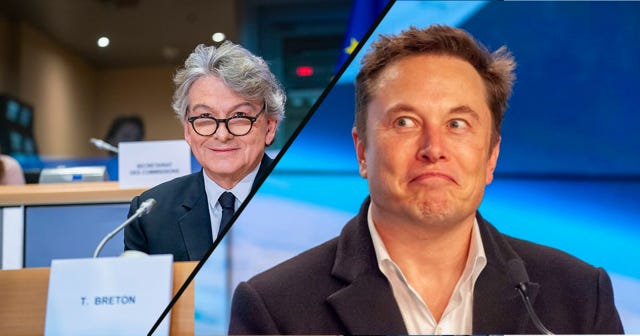The Musk-Breton Spat: Navigating the Murky Waters of Hate Speech and Free Speech
In the digital age, the boundaries between perceived free speech and perceived hate speech have become increasingly blurred, leading to contentious debates and high-profile clashes.
In the digital age, the boundaries between perceived free speech and perceived hate speech have become increasingly blurred, leading to contentious debates and high-profile clashes. One such recent spat involves Elon Musk, the tech mogul and owner of the social media platform X (formerly Twitter), and Thierry Breton, the European Union's Digital Commissioner. The crux of the conflict revolves around the EU's stringent regulations on hate speech and Musk's commitment to free speech, even when it veers into controversial territory.
The Context
Ahead of a planned interview between Musk and former U.S. President Donald Trump, Breton issued an open letter reminding Musk of his legal obligations to curb the amplification of harmful content. This move comes in the wake of the EU charging X for failing to comply with its social media laws, which could result in multimillion-euro fines. Breton's letter emphasised the potential spillover effects of harmful content into the EU, warning that the bloc could take further action to protect its citizens.
Musk's response was nothing short of provocative. He tweeted a meme containing the words: "Take a big step back and literally, fuck your own face!" This was a meme from the comedy movie Tropic Thunder. For context, it was a line from the character Les Grossman while negotiating the release of one of his clients from a terrorist organisation. This response was clearly a joke, but it has undoubtedly fuelled the debate over the subjectivity of hate speech and the complexities involved in regulating it.
The Subjectivity of Hate Speech
Hate speech is a term that is often used but rarely defined with precision. What constitutes hate speech can vary significantly depending on cultural, social, and legal contexts. In the EU, hate speech laws are designed to prevent the dissemination of content that incites violence, discrimination, or hostility against individuals or groups based on attributes such as race, religion, or sexual orientation. However, the broad and often vague definitions of hate speech can lead to subjective interpretations and potential misuse.
Critics argue that these laws can be weaponised to stifle dissent and suppress unpopular opinions. The risk is that the term "hate speech" becomes a catch-all label used to silence voices that challenge the status quo or offend certain sensibilities. This is particularly concerning in a democratic society where free speech is a fundamental right.
The Case for Free Speech
Free speech is the bedrock of any democratic society. It allows for the exchange of ideas, the challenging of authority, and the fostering of innovation and progress. While it is essential to protect individuals and groups from genuine harm, it is equally important to ensure that free speech is not unduly curtailed.
The argument for prioritising free speech hinges on the belief that open dialogue, even when it includes offensive or controversial content, is crucial for societal growth. Suppressing speech, even under the guise of preventing hate speech, can lead to a slippery slope where the definition of what is unacceptable becomes increasingly restrictive.
Specific Criteria for Hate Speech
To navigate this complex landscape, it is imperative that hate speech laws are clearly defined and narrowly tailored. Specific criteria should be established to distinguish between genuinely harmful content and speech that is merely offensive or unpopular. This would involve setting clear thresholds for what constitutes incitement to violence or discrimination, rather than relying on broad and subjective interpretations.
Moreover, there should be robust mechanisms for challenging and reviewing decisions made under hate speech laws. This would ensure that individuals and platforms have the opportunity to defend their speech and that any restrictions are applied fairly and transparently.
Conclusion
The spat between Elon Musk and Thierry Breton underscores the ongoing tension between free speech and hate speech regulation. While it is crucial to protect individuals from genuine harm, it is equally important to safeguard the fundamental right to free speech. By establishing clear and specific criteria for hate speech and ensuring robust mechanisms for review, we can strike a balance that protects both individual rights and societal well-being.
In the end, the goal should be to foster an environment where ideas can be freely exchanged, challenged, and debated, without fear of undue censorship. Only then can we truly uphold the principles of a democratic society.


